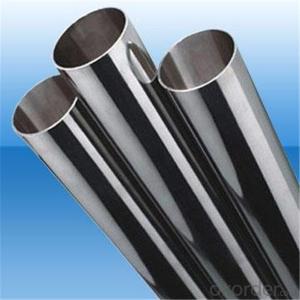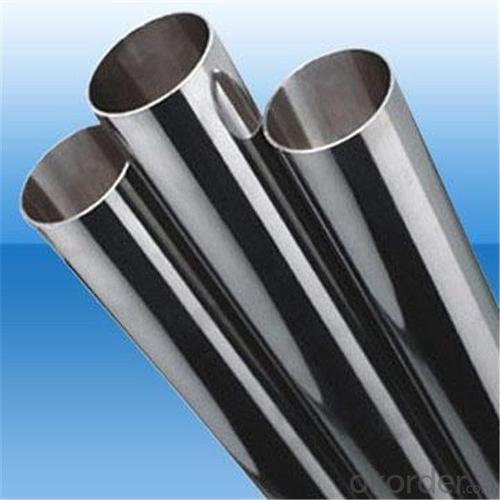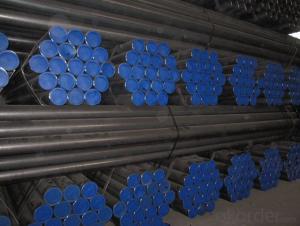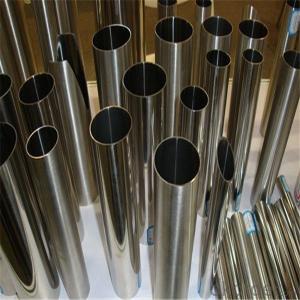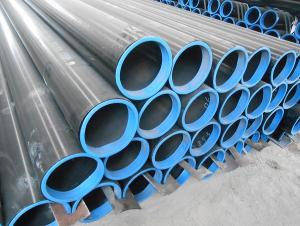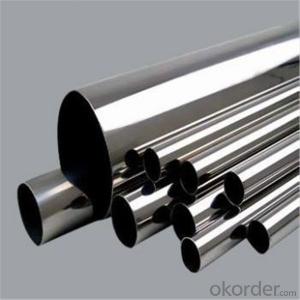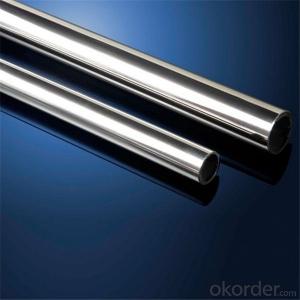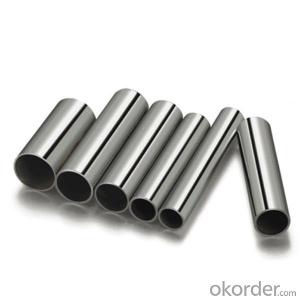Steel pipe with hot quality and selling NO. in overseas for years
- Loading Port:
- Tianjin
- Payment Terms:
- TT OR LC
- Min Order Qty:
- 1 pc
- Supply Capability:
- 10000 pc/month
OKorder Service Pledge
OKorder Financial Service
You Might Also Like
Specification
1.Structure of Seamless Pipe ASTM A106/53:
Seamless pipe is formed by drawing a solid billet over a piercing rod to create the hollow shell. As the manufacturing process does not include any welding, seamless pipes are perceived to be stronger and more reliable. Historically seamless pipe was regarded as withstanding pressure better than other types, and was often more easily available than welded pipe.
2.Main Features of the Seamless Pipe ASTM A106/53:
• High manufacturing accuracy
• High strength
• Small inertia resistance
• Good visual effect
• Reasonable price
3.Seamless Pipe ASTM A106/53 Specification:
Standard | GB, DIN, ASTM ASTM A106-2006, ASTM A53-2007 |
Grade | 10#-45#, 16Mn 10#, 20#, 45#, 16Mn |
Thickness | 8 - 33 mm |
Section Shape | Round |
Outer Diameter | 133 - 219 mm |
Place of Origin | Shandong, China (Mainland) |
Secondary Or Not | Non-secondary |
Application | Hydraulic Pipe |
Technique | Cold Drawn |
Certification | API |
Surface Treatment | factory state or painted black |
Special Pipe | API Pipe |
Alloy Or Not | Non-alloy |
Length | 5-12M |
Outer Diameter | 21.3-610mm |
Grade | 20#, 45#, Q345, API J55, API K55, API L80, API N80, API P110, A53B |
Standard | ASME, ASTM |
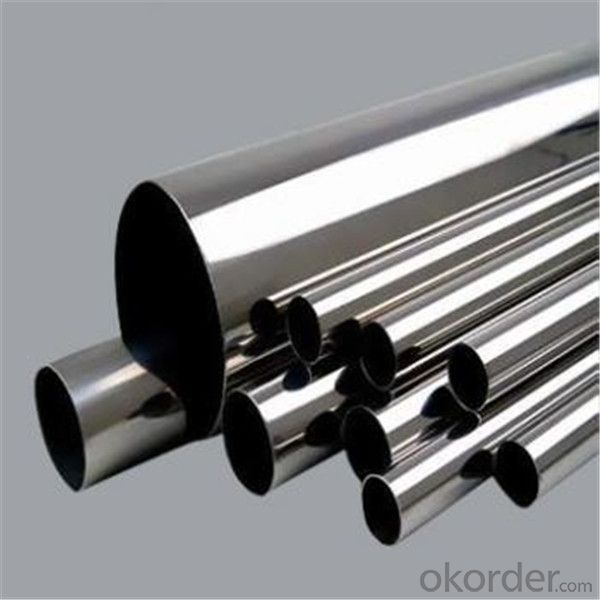
1) Material:20#(ASTM A 106/A53 GRB.API5LGRB,GB),45#,16Mn,10#.
2) Specification range:OD:21.3-610mm,WT:6-70mm,length:6-12m or according to the requirement of clients.
3) Excutive standards:GB,ASME API5L.ASTM A 106/A53,Despite of the above standards,we can also supply of our clients!
4) Surface:black lacquered,varnish coating or galvanized.
5) Ends:Beveled or square cut,plastic capped,painted.
6) Packing:bundles wrapped with strong steel strip,seaworthy packing.
4. Application of
Stainless steel pipe is used for structural and piping applications that require the properties that stainless steel delivers – high strength, toughness and excellent corrosion resistance. The pipe is available in sizes 1/2" through 36” in outside diameter (OD) and Seamless stainless pipe is used for applications that require internal pressure within the pipe such as process equipment, water treatment and marine applications.
Packaging Details: | seaworthy package,bundles wrapped with strong steel strip |
Delivery Detail: | 50-60days after received 30%TT or Original LC |
6.FAQ of Seamless Pipe ASTM A106/53:
A. How is the quality of your products?
Our products are manufactured strictly according to national and internaional standard, and we take a test on every pipe before delivered out. If you want see our quality certifications and all kinds of testing report, please just ask us for it.
Guaranteed: If products’ quality don’t accord to discription as we give or the promise before you place order, we promise 100% refund.
B.How about price?
Yes, we are factory and be able to give you lowest price below market one, and we have a policy that “ for saving time and absolutely honest business attitude, we quote as lowest as possible for any customer, and discount can be given according to quantity”,if you like you think, just don’t waste your time.Please trust the quotation we would give you, it is professional one.
C.Why should you chose us?
Chose happens because of quality, then price, We can give you both.Additionally, we can also offer professional products inquiry, products knowledge train(for agents), smooth goods delivery, exellent customer solution proposals.
Any question, pls feel free to contact us !
- Q: How do steel pipes compare to other materials like PVC or copper pipes?
- Steel pipes have numerous advantages over materials such as PVC or copper pipes. Firstly, their strength and durability make them ideal for high-pressure applications. They can withstand extreme temperatures and resist corrosion, making them suitable for both indoor and outdoor use. In contrast, PVC pipes are weaker and more prone to cracking and breaking under pressure or in extreme temperatures. Although copper pipes are durable, they can be susceptible to corrosion and may require additional protective coatings. Secondly, steel pipes have a longer lifespan compared to PVC or copper pipes. They are renowned for their longevity and can last for several decades without needing replacement. PVC pipes, although relatively inexpensive, have a shorter lifespan and may require more frequent replacement. Similarly, copper pipes can corrode over time and may need maintenance or replacement. Another advantage of steel pipes is their ability to handle a wide range of fluids and substances. They are commonly used in industrial applications where chemicals or corrosive materials may be present. PVC pipes, on the other hand, may not be suitable for handling certain chemicals or substances as they can react and cause damage to the pipe. Copper pipes, while generally safe for carrying water, may not be ideal for conveying certain chemicals or fluids. Additionally, steel pipes possess excellent fire resistance properties. In the event of a fire, they can withstand high temperatures and maintain their structural integrity, ensuring the safety and protection of the surrounding area. PVC pipes, however, can melt or deform under high heat, potentially causing structural damage. Although copper pipes are less prone to melting, they can still be affected by extreme heat and lose their strength. Nevertheless, steel pipes do have a few drawbacks. They tend to be heavier and more challenging to install compared to PVC or copper pipes. Additionally, they can be more expensive upfront, especially when compared to PVC pipes. However, considering their durability and longevity, steel pipes may offer better value in the long run. In conclusion, steel pipes provide numerous advantages over materials like PVC or copper pipes. They are strong, durable, resistant to corrosion, and have a longer lifespan. They can handle high-pressure applications and a wide range of fluids, making them suitable for various industrial and commercial uses. Although they may be more expensive and difficult to install, the benefits of steel pipes make them a reliable and cost-effective choice for many applications.
- Q: Can steel pipes be used for underground applications?
- Yes, steel pipes can be used for underground applications. Steel pipes are highly durable and can withstand the pressure and corrosion that may be encountered in underground environments. They are commonly used for various underground applications such as water supply, sewage systems, and underground utility lines.
- Q: How are steel pipes used in the construction of natural gas power plants?
- Steel pipes are used in the construction of natural gas power plants for various purposes such as transporting natural gas from the source to the plant, distributing gas within the facility, and carrying exhaust gases away from the plant. They are essential for maintaining a safe and efficient flow of natural gas throughout the power plant's infrastructure.
- Q: How are steel pipes used in the manufacturing of renewable energy systems?
- Steel pipes are widely used in the manufacturing of renewable energy systems due to their durability, strength, and versatility. They are commonly used in the construction of wind turbines, solar panels, and geothermal systems. Steel pipes are used as support structures for wind turbine towers, providing stability and withstanding harsh weather conditions. In solar panel systems, steel pipes are used as frames to hold the panels in place, ensuring their proper alignment and stability. Additionally, steel pipes are used in geothermal systems to transport hot water or steam from underground reservoirs to the surface for electricity generation. Overall, steel pipes play a crucial role in the manufacturing of renewable energy systems, contributing to their efficiency and longevity.
- Q: Can steel pipes withstand high temperatures?
- Yes, steel pipes can withstand high temperatures. Steel is known for its excellent thermal conductivity and high melting point, making it suitable for various applications that involve exposure to elevated temperatures.
- Q: What are the different grades of steel used for pipes?
- The different grades of steel used for pipes include carbon steel, alloy steel, and stainless steel.
- Q: How are steel pipes used in the manufacturing of agricultural machinery?
- Steel pipes are commonly used in the manufacturing of agricultural machinery for various purposes such as structural support, fluid transportation, and protection. They are utilized to create the framework and chassis of the machinery, providing strength and durability. Steel pipes are also used to transport fluids such as fuel, water, and chemicals throughout the machinery. Additionally, steel pipes can be used to protect vulnerable components from external elements, ensuring the longevity and reliability of the agricultural machinery.
- Q: The plastic pipe and steel pipe difference
- In the plastic coated galvanized steel pipe inside the plastic coated manufacturing method. The thickness of the internal plastic is thin, which is equal to a plastic skin.
- Q: What is the lifespan of galvanized steel pipes?
- The lifespan of galvanized steel pipes can vary depending on various factors such as the environment, usage, and maintenance. However, on average, galvanized steel pipes can last between 40 to 70 years.
- Q: Are steel pipes resistant to UV degradation?
- Steel pipes are generally not resistant to UV degradation. Exposure to ultraviolet (UV) radiation over time can cause steel pipes to undergo various forms of degradation. UV radiation can cause the steel to become brittle, leading to cracking and potential failure. Additionally, UV radiation can also cause corrosion and discoloration on the surface of the steel pipes. To mitigate the effects of UV degradation, protective coatings or paint can be applied to the steel pipes to provide a barrier against UV radiation. Regular maintenance and inspections are also necessary to identify any signs of UV degradation and take appropriate measures to prevent further deterioration.
Send your message to us
Steel pipe with hot quality and selling NO. in overseas for years
- Loading Port:
- Tianjin
- Payment Terms:
- TT OR LC
- Min Order Qty:
- 1 pc
- Supply Capability:
- 10000 pc/month
OKorder Service Pledge
OKorder Financial Service
Similar products
Hot products
Hot Searches
Related keywords
